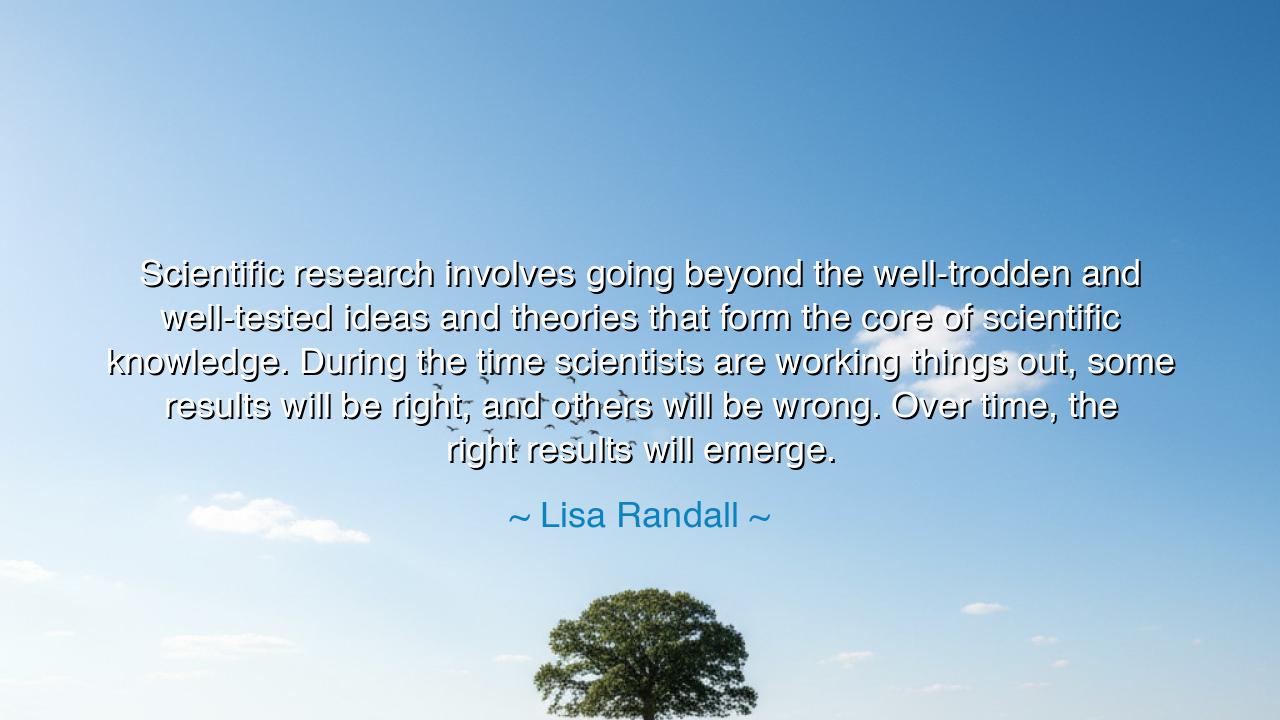
Scientific research involves going beyond the well-trodden and
Scientific research involves going beyond the well-trodden and well-tested ideas and theories that form the core of scientific knowledge. During the time scientists are working things out, some results will be right, and others will be wrong. Over time, the right results will emerge.






In the luminous words of Lisa Randall, physicist and seeker of cosmic truth, we find a hymn to the courage of the human mind: “Scientific research involves going beyond the well-trodden and well-tested ideas and theories that form the core of scientific knowledge. During the time scientists are working things out, some results will be right, and others will be wrong. Over time, the right results will emerge.” In this statement, Randall gives voice to one of the oldest and most noble struggles of the human spirit — the tension between certainty and discovery, between the comfort of the known and the perilous beauty of the unknown. Her words call us to walk, like ancient explorers, into the mists of mystery, guided not by the promise of perfection but by faith in truth’s eventual triumph.
The origin of this quote arises from Randall’s life as a theoretical physicist, a woman who has dared to peer into the hidden dimensions of the universe. In her work on particle physics and cosmology, she has explored realities beyond sight and comprehension — realms where mathematics becomes poetry and logic dances with imagination. Yet even in her mastery, she confesses the humility of all great scientists: that knowledge is never fixed, and discovery is never clean. In the laboratory, as in life, progress emerges not from unbroken success but from the relentless refinement of error. The great experiment is always ongoing, for truth reveals itself slowly, as the dawn dispels the night one ray at a time.
Her words echo the wisdom of ancient philosophers who first sought to understand the order of the cosmos. The Greeks spoke of “aletheia” — the unveiling of truth — which does not come in a single flash, but through continual striving, doubt, and correction. Likewise, in the halls of Alexandria or the deserts where scholars mapped the stars, knowledge was seen not as a possession, but as a pilgrimage. Lisa Randall’s message restores this sacred view of science: that to know is not to have conquered uncertainty, but to have befriended it. The path of the scientist, like that of the sage, is walked with patience and faith, knowing that truth, though sometimes obscured, will ultimately prevail.
Consider the story of Galileo Galilei, who dared to lift his telescope to the heavens and saw what others feared to see. His discoveries — the moons of Jupiter, the phases of Venus — shattered the well-trodden theories of his age. For his courage, he was condemned, his name stained by those who clung to comfort over truth. Yet centuries later, the right results emerged; his insights were vindicated, and his defiance became the cornerstone of modern science. Galileo’s journey mirrors Randall’s teaching: that between error and enlightenment lies the crucible of discovery. The wrong steps of today are often the stepping stones of tomorrow’s wisdom.
There is a deeper spiritual current in Randall’s words — the humility to accept that the human mind is not infallible. Too often, the world worships certainty, mistaking it for strength. But true wisdom lies in recognizing the limits of one’s understanding. The scientist who admits doubt is not weak; she is courageous, for she has chosen truth over pride. In this, science and philosophy are one: both demand the surrender of ego, both require patience with imperfection, both teach that error is the price of progress.
Let us then take this teaching beyond the realm of laboratories and into the vast experiment of our own lives. Every human being, in their search for meaning, walks a path of trial and correction. We make mistakes, we revise our understanding, and through this process, our truer selves begin to emerge. Just as science advances by discarding falsehoods, so too do we evolve by letting go of what no longer serves us. To seek truth — whether in physics or in the soul — is to accept that we will be wrong before we are right, lost before we are found.
So let this wisdom of Lisa Randall guide all who strive toward knowledge: do not fear uncertainty; embrace it. Go beyond the well-trodden paths — in study, in spirit, in the heart’s own long quest. For the universe itself was born of chaos, yet from that chaos, order arose. Trust, then, that truth too will arise from confusion, if only we persevere. The wrong steps are not to be mourned, but honored, for they mark the road to discovery.
And thus, children of curiosity and seekers of truth, remember: it is not perfection that leads to greatness, but perseverance. The right results will emerge, not through haste, but through the steady patience of those who refuse to give up on understanding. Walk forward, question boldly, and when you stumble, rise again — for every misstep is a lesson, and every lesson a light. In time, as Randall promises, the truth will reveal itself, radiant and undeniable, like the first sunrise upon the face of a newly discovered world.






AAdministratorAdministrator
Welcome, honored guests. Please leave a comment, we will respond soon